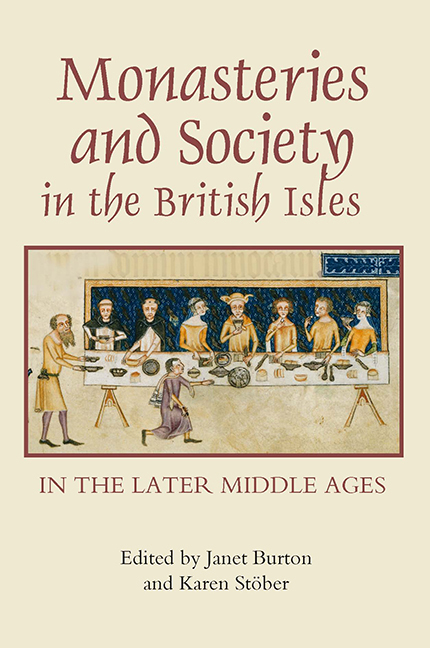Book contents
- Frontmatter
- Contents
- List of illustrations
- Acknowledgements
- List of contributors
- Abbreviations
- Introduction
- The Meeting of the Worlds
- Religious Houses and their Patrons and Benefactors
- Female Communities: Nuns, Abbesses and Prioresses
- Monasteries and Education
- Monasteries and Urban Space
- Religious Houses in the Regions
- Index of Religious Houses mentioned in the text
- Index
- Miscellaneous Endmatter
Introduction
Published online by Cambridge University Press: 24 October 2017
- Frontmatter
- Contents
- List of illustrations
- Acknowledgements
- List of contributors
- Abbreviations
- Introduction
- The Meeting of the Worlds
- Religious Houses and their Patrons and Benefactors
- Female Communities: Nuns, Abbesses and Prioresses
- Monasteries and Education
- Monasteries and Urban Space
- Religious Houses in the Regions
- Index of Religious Houses mentioned in the text
- Index
- Miscellaneous Endmatter
Summary
In 2001 Joan Greatrex wrote in her chapter on recent developments in monastic history that ‘in the last twenty years there has been an impressive increase of interest in the study of monastic history’. The present volume is reassuring testimony that the developments so welcomed by Greatrex have not ceased since she applauded them some five years ago. On the contrary, monastic history continues to go from strength to strength: scholars continue to explore uncharted territories and they are reassessing the findings of earlier generations of historians such as Dom David Knowles through the use of previously neglected sources, documentary, literary, archaeological and artefactual. More attention has been paid to those ‘lesser’ religious houses, for which the surviving evidence does not always abound. Different kinds of questions have been asked by historians, whose primary interest is gradually shifting from a predominantly institutional approach to late medieval monasticism to an increasingly socio-cultural-economic one. In this context, the external relations and networks of religious communities, be they with patrons and benefactors or with other secular authorities including the Crown, have received particular consideration.
The fifteen chapters in this collection represent the proceedings of an international conference on ‘Monasteries and Society in the later Middle Ages’, organised by the History Departments at Aberystwyth and Lampeter and held in April 2005 at Gregynog Hall (Powys). The conference brought together scholars from different institutions working on diverse aspects of monastic history and focused on the wide range of contacts which existed between religious communities and the laity in the later medieval British Isles.
Advances in approaches to medieval monastic history are not solely a matter of investigating new and hitherto unexploited sources, valuable though that is for deepening our understanding of this central medieval phenomenon. It is clear that historians are now questioning some of the older assumptions about monastic life in the later Middle Ages, and setting new approaches and a new agenda. The present volume is in line with these developments in a number of ways. First of all, as the title indicates, the scope is not limited to England.
- Type
- Chapter
- Information
- Publisher: Boydell & BrewerPrint publication year: 2008



